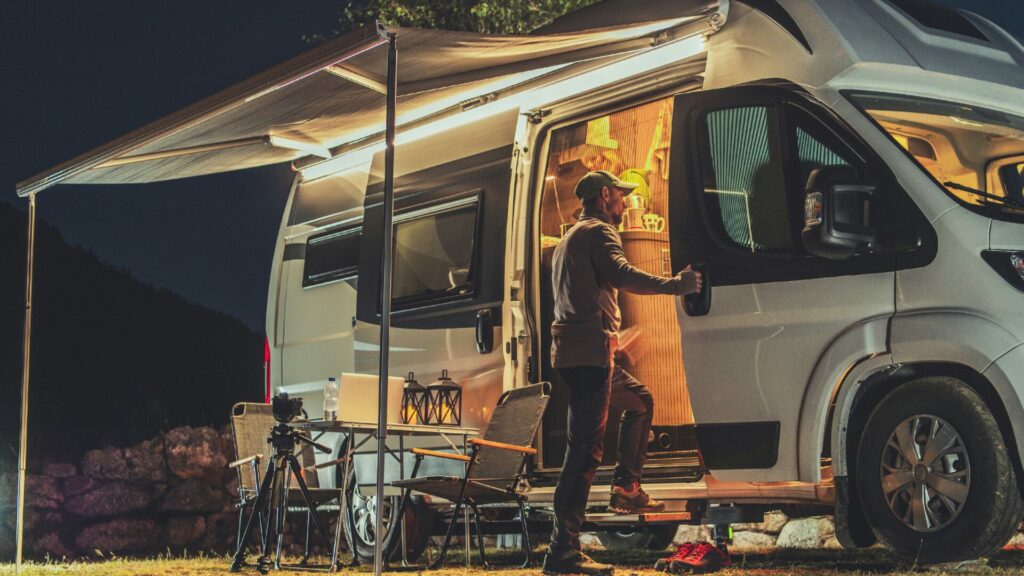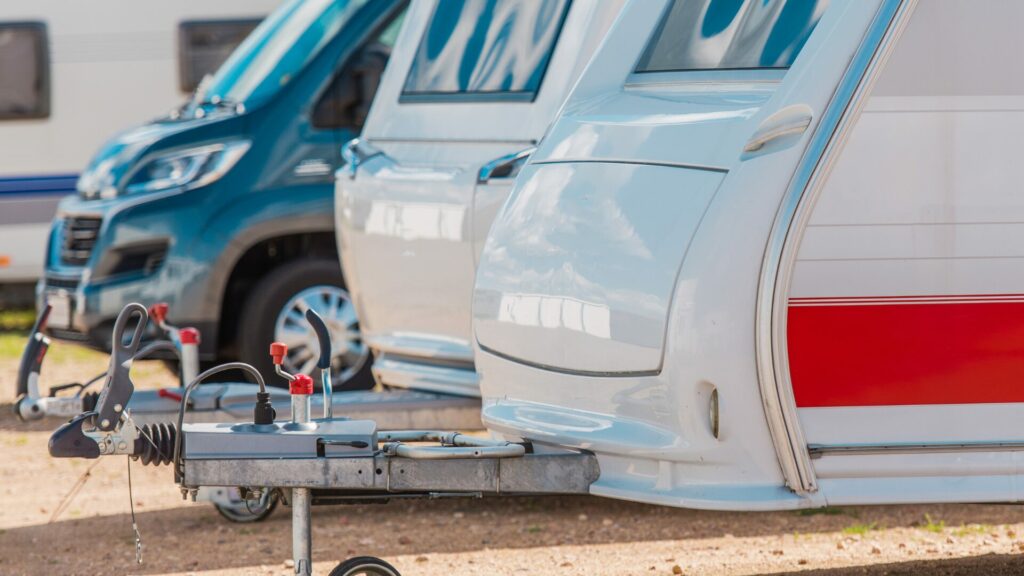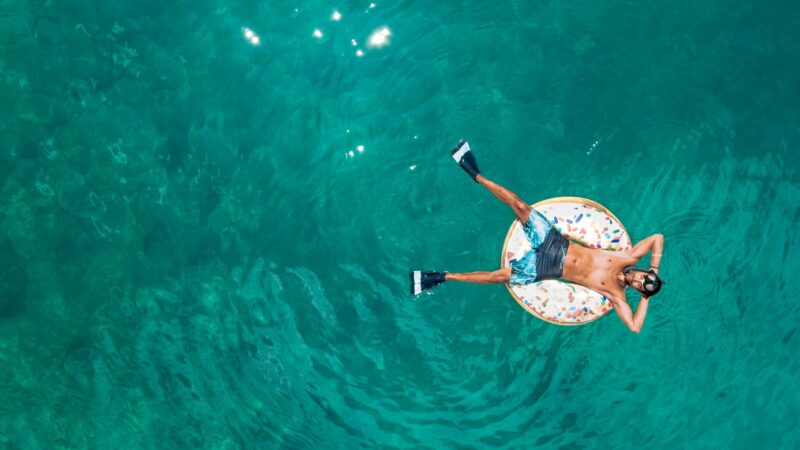Table of Contents Show
Are you a full-time RVer who has thought about taking a vacation but is worried about what to do with your RV while you’re gone? If so, we have some tips to help you feel comfortable and understand the options. Full-timing isn’t a 24/7/365 vacation, so you must take time off! Let’s dive in and learn how full-timers vacation away from their rigs!
What’s the Difference Between A Full-Time RVer and Weekend Warrior?
Full-time RVers live in their rigs, whereas weekend warriors enjoy camping on the weekends. Some full-timers may still own a house, while others have sold everything to hit the road. Stationary full-timers have a lot at an RV park and don’t travel but still live in their rig.
Weekend warriors may extend their stays to three or four days or even go to the beach for a week in the summer. Although, they don’t live in their RVs. Their rigs are stored at a facility, at their house, or on a seasonal lot.
Are Full-Timers Always On Vacation?
It’s a misconception that full-time RVers are always on vacation. Many of these travelers work full-time from the road. They may have remote jobs or work at campgrounds. Some are traveling nurses or line workers who move to the next job every few months. In fact, many full-timers struggle to go on vacation because of the hassle of finding a place to store their RV.

New RVer Asks Facebook Group How To Vacation Away From Their RV
A new RVer recently asked a Facebook RVing group about how to vacation away from their RV. She and her husband are planning a trip and don’t know how to work out the logistics.
She asked, “What do you do with your rig if you have to fly back to your home base for a week? We are taking off in late February/early March, but in late April, my husband has a golf trip for a friend’s birthday. He needs to fly to their destination, and I thought about going home for a few reasons before we get back on the road. But where do we leave/what do we do with our coach?”
Where Can You Find RV Storage Options?
First, decide whether to store your RV or leave it on a site. Some campgrounds don’t require you to be present with your RV as long as you pay the nightly rate. Others don’t allow you to leave the RV unattended overnight.
There are pros and cons to both decisions. Paying for a week or more at a campsite can be more expensive. On the other hand, you’re hooked up to electricity and don’t have to worry about emptying your fridge.
If you put it in storage, the facility may be out of the way, but it’s often cheaper. However, you’ll also need to consider how much time and effort it will take to clean it out of food so that rodents aren’t attracted to your rig, and food doesn’t spoil. Determine what’s best for you and your RV while you’re away.
If you store your rig, opting to not leave it sitting in a campsite, you can call local campgrounds and ask about storage options. One of the group members, Debby Hunter, advises, “Many RV parks have a boneyard, storage section. Assuming you’re in a park, ask the office what options you have, determining your return date to get your spot back.”
You can also call self-storage facilities nearby. Some offer RV storage. If you have the budget, consider renting an inside space to protect your rig from the elements and rodents. If that’s not an option, check the facility for security features like cameras, a locked gate, and a fenced area.

5 Tips For Leaving Your RV Short-Term
We prefer to leave our rig in a campground at a site. Depending on how safe you feel, you can tell the campground staff or not. We’ve done it both ways. You might have to pay an unoccupied fee, so be aware of that.
Another group member, Rob Howland, advises, “Your best security is in an RV park, not a storage lot. Tell management you will be gone, share emergency numbers, and tell one or two neighbors around your rig your plans.” These are great tips if you’re leaving your rig alone for more than a couple of days. Here are a few more we’d like to share!
Remove All Food
If you’re leaving your RV hooked up to electricity, try to leave your fridge as bare as possible. Since that’s not always possible with full-timing, group member Kimberly Coyne gives a great tip: “If you have food in the fridge or freezer, fill a solo cup about 1/4 full with water and freeze it. Before you leave, put a penny on top of the ice. When you get back, if the penny is at the bottom, you had a power cut, and all the food got warm, so throw it out. If the penny is still on top, all the frozen foods should be fine to eat!”
If you’re taking your RV to a facility for storage, you’ll need to remove all food from the fridge and freezer. Prop open the doors so you don’t come back to mold or mildew. Make sure all food in cabinets is stored in containers with tight lids. Anything loose – like a chocolate bar or a pack of crackers – should go with you or in the trash. These types of foods attract bugs and rodents.

Dump Your Tanks and Turn Off Water
If you’re leaving your rig at a campsite, empty your tanks and turn off the water. We also suggest removing your water hose from the spigot. Tank waste can build up over several days if it’s not swishing about. You don’t want to return to a gunk-filled black tank that won’t empty. So, even if you’re taking your RV to a storage facility, don’t forget to do this before you leave your last campsite.
Turning off the water is critical to ensure you don’t have an accidental flood in your rig. This is why we also advise removing the hose. Should a staff member come by and test the water for some reason while you’re gone, you don’t want them reattaching your hose and turning back on the water source.
Turn Off Propane
Turn off the propane if you’re leaving your RV at a campsite or storage facility. You’re not using the appliances while you’re gone, so there’s no need to keep it on. Your rig is safer with no chance of a propane leak and without propane in the lines.

Use Moisture Packs
Pick up a few moisture packs from Walmart or Costco to avoid moisture buildup in humid areas. RVers often use Damp-Rid. This brand has buckets and hanging bags. Put them throughout the rig – in closets, in the bathroom, and in each room if you have a larger RV.
- DON’T JUST COVER UP ODORS, ELIMINATE THEM: DampRid Fresh Scent Hanging Moisture Absorbers attract and trap excess…
- 14% MORE MOISTURE ABSORBING POWER*. You can see DampRid work as it attracts and traps excess moisture. 3 Pack of…
This isn’t necessary if you’re just leaving your RV for a couple of days. If you’re going to be gone for more than three or four days, we suggest ensuring moisture doesn’t accumulate while you’re gone. Remember, moisture is an RV’s worst enemy.
Pro Tip: If you’re concerned about moisture in your RV often, be sure to read RV Condensation: Keeping Moisture Out… for more on the topic!
Book RV Storage If Leaving For Awhile
Finally, although we suggest leaving your RV at a campsite if you’re going on vacation, we don’t advise this for long periods. Maybe up to two weeks would be okay. Though, it’s best to find a storage facility if you’re going to Europe for a month or staying with family over the holidays for several weeks.
Indoor storage is expensive, but if you have the budget, it’s worth it for the added protection from the weather. Your RV is also less likely to attract bugs and rodents. And when it’s out of sight, thieves are less likely to attempt to steal it.
Covered storage is another good option. Your RV is at least protected from the sun, hail, wind, and snow when it’s parked under a roof. Yet, if you can’t find indoor or covered storage options, find a facility where you feel safe leaving your rig. When you full-time RV, your RV is your home. So, don’t just leave it anywhere. You might have to spend more on additional security features, but protecting your home is worth it.
Full-Timers Need to Vacation Too
Full-time RVers can find it challenging to plan a vacation. They don’t want to spend the money to store their rig and don’t want to deal with the hassle of cleaning it out of food. It’s also worrisome to leave your home behind in an unfamiliar location.
Full-timers must go on vacation. Traveling the country and seeing unique places is a fantastic way to explore nature, learn new things, and enjoy outdoor adventures. In contrast, it’s not a 24/7/365 vacation. The next time you’re considering going on vacation or leaving your rig behind to fly to visit family, we hope these tips will help you feel more comfortable and understand your options.
Are you longing for a vacation?
Last update on 2024-12-25 / Affiliate links / Images from Amazon Product Advertising API






